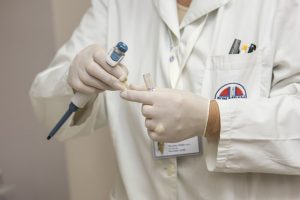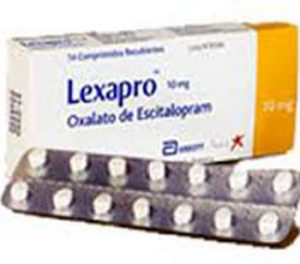Video Link: https://vimeo.com/316600098
Video Download: Click Here To Download Video
Video Stream: Click Here To Stream Video
Video Link: https://vimeo.com/316641890
Video Download: Click Here To Download Video
Video Stream: Click Here To Stream Video
What is Escitalopram?

Escitalopram is a commonly prescribed antidepressant that also goes by many other brand names, including Cipralex and Lexapro.
Escitalopram belongs to a class of antidepressant medications known as Selective Serotonin Reuptake Inhibitors (SSRIs) and is FDA approved for the treatment of Generalized Anxiety Disorder and Major Depressive Disorder, both conditions which are most often associated with abnormally low levels of Serotonin in the bloodstream.
SSRIs like Escitalopram prevent Serotonin from being reabsorbed as quickly, allowing them to remain active in the space between neurons for a more extended period. This medication is approved for patients twelve years of age or older.
Escitalopram and Citalopram
Escitalopram (Lexapro) is a stereoisomer of another medication known as citalopram (Celexa), meaning that the molecular configuration of the two compounds are identical, except they are mirror images of one another.
Escitalopram is known as an S-Stereoisomer, which references its configuration from a standardized position.
Pharmaceutical Uses of Escitalopram (Lexapro)
In the United States, Escitalopram (Lexapro) is approved for Generalized Anxiety Disorder and Major Depressive Disorder.
In Europe, Escitalopram has a broader range of approved uses, including panic disorder, obsessive-compulsive disorder, social anxiety disorder, as well as Generalized Anxiety Disorder, and Major Depressive Disorder.
In the United States, Escitalopram is often prescribed off-label for these purposes, based on existing research and overseas acceptance for such purposes.
Escitalopram (Lexapro) for Depression
Escitalopram has undergone thorough testing for effectiveness, in the form of four thoroughly controlled clinical trials.
Of these four trials, three of them provided statistically significant proof that the treatment was more effective than placebo at alleviating the effects of depression.
Patients that take Escitalopram of other Selective Serotonin Reuptake Inhibitors  for depression generally report that the drugs can significantly improve mood and quality of life.
for depression generally report that the drugs can significantly improve mood and quality of life.
The treatment can also impact the behavior of the patient and the way that he or she interacts with others.
These potential changes can be so profound that they make certain patients tentative about seeing a doctor.
They think that treating their depression will change who they are. The best way to describe how SSRIs work concerning depression (and anxiety) is that they alleviate the symptoms of these disorders which prevent the patient from allowing their inner personality and voice to rise above the artificial limitations imposed by their condition.
To the outside observer, this can sometimes seem like a total transformation, but the patient merely is exposing himself or herself to others in a way that was previously difficult or impossible.
SSRIs Like Escitalopram Among Best First Treatment Options for Depression and GAS
SSRIs like Escitalopram are one of the most preferred methods to treat Depression and Anxiety because they have a much lower incidence of side effects than their predecessors, as well as many of their contemporaries, combined with a high level of success and a low level of relapse potential if the treatment is initially effective.
Also, when side effects do take place, they are generally relatively mild and dissipate in the early phase of treatment.
Older anti-depressants were and are highly effective, but they represent a much higher danger of serious side effects. In fact, the side effects are so severe in some of these other medications that a patient could potentially die after only a month of an overdose.
Lexapro vs. Celexa
In spite of the effectiveness of the medication, there is some controversy regarding the use of Escitalopram as an SSRI treatment.
There has been debate regarding whether the company that first produced Citalopram (Celexa) pushed Escitalopram out to the market to extend their patent rights (in a process known as evergreening).
However, further research has shown that Escitalopram does have benefits in comparison to Citalopram, specifically in areas of tolerability and effectiveness.
Research resulting directly from this contention showed that Escitalopram had a slightly better efficacy profile than Citalopram under most circumstances, but more recent studies have come to the conclusion that Citalopram, Escitalopram, and other similar SSRIs known as Second Generation Antidepressants are mostly interchangeable.
Since Escitalopram lost patent protection in 2012, the two drugs have very similar cost-points, making the prescription choice more or less up to the individual discretion of the prescribing physician and the patient.
Both the American Psychiatric Association and the National Institute of Health have both agreed upon this perspective.
Escitalopram (Lexapro) for Anxiety Disorders
Though there is some debate regarding the effective use of Escitalopram for Depression, the body of evidence is much more pronounced in favor of Escitalopram.
Unlike many other psychological medications, Escitalopram is fast-acting for many patients suffering from Generalized Anxiety Disorder, some of which experience significant benefits within the first seven days of treatment.
By two months, most patients prescribed Lexapro experience significant alleviation of symptoms, associated with improved functionality and quality of life improvement.
In addition to this, Escitalopram is also useful for long-term use, with only one in five patients experiencing a relapse of Generalized Anxiety disorder, as opposed to just one in two patients prescribed a placebo.
Regarding Panic Disorder, both Citalopram and Escitalopram are of statistically similar effectiveness.
Other Clinical Uses of Escitalopram (Lexapro)
SSRIs, including Escitalopram, have been prescribed to significant effectiveness for women suffering from Premenstrual Syndrome, also known as PMS.
The treatment is useful both when taken during a specific portion of the cycle (luteal phase) and when taken at all times.
Escitalopram has been prescribed off-label for Seasonal Affective Disorder, but there is insufficient data to provide a definitive rating of effectiveness.
The effectiveness of Escitalopram (Lexapro) in Comparison to Other Medications
Recent studies have shown that, in addition to being a highly effective treatment for Generalized Anxiety Disorder, Escitalopram is one of the best treatments available for depression as well.
In a survey of research and clinical use, Lexapro was found to be second only to Sertraline (Zoloft) in effectiveness.
Historically, physicians have prescribed SSRIs primarily upon non-rigorous evidence they have received from treating their own patients and discussing apparent treatment effectiveness with their peers, as well as the risk or appearance of side effects for the patient.
This study is the first of its kind to scientifically evaluate the effectiveness of these depression treatments in a manner that can be quantitatively analyzed.
Escitalopram (Lexapro) Prescription Guidelines
In the United Kingdom, potential risks associated with Escitalopram have led medical boards to regulate the medication, ascribing maximum dosages for legal use. For adult patients, no more than 40 milligrams are to be prescribed per day.
For patients over 65, 10 milligrams is the maximum dose, and patients with liver problems are limited to 20 milligrams.
Citalopram is under very similar guidelines, the only difference being a slightly larger allowance for patients over the age of 65 (20 milligrams).
In the United States, the ideal prescription depends upon how the patient takes to treatment, as well as their age and liver profile.
For both adult and adolescent patients, the preliminary dosage is generally 10 milligrams per day, but if this is found to be insufficient, the dose can be increased to 20 milligrams.
Elderly patients and patients with liver problems are prescribed no more than 10 milligrams per day, generally.
Side Effects of Escitalopram (Lexapro)
Escitalopram is associated with some side effects, all of which are low in incidence, but should be noted before beginning therapy.
Some of the most notable side-effects of Escitalopram are related to sexual function, including the inability to orgasm, reduced sensitivity of the genitals, delayed orgasm, and decreased sex drive.
There is some evidence that suggests that patients that use Escitalopram and similar SSRI medications have an increased risk of suicidal thoughts and actions, but because of the statistical irregularity of suicide in the context of clinical trials, it is difficult to draw definitive conclusions without an extraordinarily large pool of patients.
Does Escitalopram (Lexapro) Lead to Weight Gain?
Some antidepressants are associated with an increased incidence of weight gain, but this is not the case for Escitalopram.
Clinical evaluations have shown that Escitalopram led to a small increase in weight on average, but insignificant when compared to placebo patients.
Weight gain was insignificant for patients of all ages. In particular cases, Escitalopram may actually be able to encourage weight loss, specifically in the case of patients that are overweight or obese as a result of binge eating associated with anxiety or depression.
Escitalopram (Lexapro) and Heart Health
Both Escitalopram and Citalopram are correlated with abnormal changes in heartbeat, dependent upon the dose administered.
Specifically, these drugs can lead to a condition known as QT Interval Prolongation. This is not an issue for the majority of patients, but for patients  with congenital or acquired problems with QT Lengthening, the treatment should either not be used or used cautiously.
with congenital or acquired problems with QT Lengthening, the treatment should either not be used or used cautiously.
Patients with heart disease are at elevated risk as well.
Long QT Intervals in a vacuum are not associated with increased mortality risk, but other issues can lead to an increased risk of sudden death or other potentially fatal heart conditions.
Patients at risk should undergo ECG before initiating treatment to prevent these risks
Escitalopram (Lexapro) Drug and Herbal Interactions
There are certain medications and supplements that should be used cautiously (if at all) in combination with Escitalopram.
For example, combining St. John's Wort with Escitalopram can lead to a dangerous and potentially deadly condition known as Serotonin syndrome.
Cough suppressants containing dextromethorphan, also known as DXM, can be dangerous in combination with Escitalopram because the interaction can lead to side effects including liver damage and Serotonin Syndrome.
Another drug, known as Omeprazole (Prilosec), increases the activity of Escitalopram by around half, and when combining these two medications, caution should be exercised.
Escitalopram (Lexapro) Side Effects by Occurrence
Common Escitalopram Side Effects (10%+ Risk)
- Nausea
- Headache
Somewhat Common Escitalopram Side Effects (1-10% Risk)
- Inability or Difficulty Achieving Orgasm
- Reduced Sex Drive
- Strange or Altered Dreaming
- Restlessness
- Anxiety
- Increased Appetite
- Inhibited Appetite
- Tremors
- Tingling Sensation
- Dizziness
- Sleepiness
- Insomnia
- Joint Pain
- Sweating
- Dry Mouth
- Vomiting
- Constipation
- Yawning
- Nasal Congestion
- Erectile Dysfunction
- Issues Ejaculating
- Fever
- Fatigue
- Muscle Pain
Escitalopram (Lexapro) Withdrawal Symptoms
When a patient stopped taking Escitalopram, especially if they have taken it for an extended period and stopped suddenly, there is a chance that they will experience side-effects related to withdrawal. These side effects include
- Irritability
- Depression
- Dizziness
- “Electric” Sensations in the Brain
- Issues with Bladder Control
- Compulsive Restlessness
Escitalopram (Lexapro) and Pregnancy
There is evidence that Escitalopram may increase the risk of temporary neonatal issues at birth if taken during the third trimester, including gastrointestinal, respiratory, motor, and central nervous system issues.
Escitalopram (Lexapro) Overdose Side-Effects and Overdose Amount
A single overdose of Escitalopram does not generally lead to significantly dangerous side effects.
The most common side-effects of Escitalopram overdose are elevated heart rate  and irritability. Less common side effects include involuntary muscle contractions, muscle tightness, and tics or other involuntary movements.
and irritability. Less common side effects include involuntary muscle contractions, muscle tightness, and tics or other involuntary movements.
Under normal circumstances, serum Escitalopram levels are designed to be between 20 and 80 micrograms per liter. Older patients with liver problems may experience serum levels of 80-200 micrograms per liter.
This is one important reason why older patients get lower doses. Their bodies metabolize the medication more slowly, causing levels to remain higher in the blood for longer than in healthy patients.
A significant overdose, or specific genetic abnormalities related to Escitalopram metabolism, may also lead to these elevated concentrations.
Is Lexapro Safer Than Celexa?
Although the two drugs have very similar pharmacological profiles, evidence suggests that Escitalopram (Lexapro) has a lower risk of complications than Citalopram (Celexa) regarding dangers associated with overdose.
Escitalopram Pharmacology
Escitalopram improves symptoms or anxiety of depression by increasing the activity of Serotonin between synapses in the brain. This is the primary function of all Selective-Serotonin Reuptake Inhibitors, although each treatment has its own unique secondary effects.
When Serotonin is released in response to a stimulus, it remains active in the space between neurons, facilitating a neurological balance associated with reduced anxiety and elevated mood.
In patients with Generalized Anxiety Disorder or Major Depressive Disorder, Serotonin is either not produced in sufficient quantities or is reabsorbed into the neuron too quickly.
SSRIs increase the activity of Serotonin in the intrasynaptic area by blocking the activation sites on the presynaptic neuron, known as Human Serotonin Transporters (SERTS), slowing down the rate at which Serotonin is reabsorbed.
These proteins draw Serotonin back into the firing neuron before recycling it.
Escitalopram is of particular note among SSRIs, because it bonds most readily with Human Serotonin Transporters as compared to any of its relatives.
Escitalopram is considered more effective at reducing symptoms of anxiety and depression than its immediate relative Citalopram. Citalopram is a racemic medication, which contains 50/50 Citalopram and Escitalopram.
Citalopram is not as effective at alleviating symptoms and blocks the activity of Escitalopram, inhibiting the overall Serotonin-boosting power of the treatment.
It is possible that Escitalopram can be inhibited by elevated activity of P-glycoproteins. Preliminary animal research suggests that simultaneously inhibiting P-glycoprotein and administering Escitalopram increases the ability of Escitalopram to pass the blood-brain barrier, thus increasing the effectiveness and potency of treatment.
Escitalopram (Lexapro) Interactions
Certain drugs should never be combined with Escitalopram, because of the risk that they represent to the patient.
These include any MAO-Inhibitors and other drugs that encourage Serotonin activity. MAO-Inhibitors were the original form of depression treatment, so the two drugs both affect Serotonin Levels.
Because SSRIs like Escitalopram have a much higher safety profile, MAO-Inhibitors are rarely prescribed for depression unless other treatments were found to be ineffective.
Because of Escitalopram's potential effect upon heartbeat, it should not be combined with other drugs that are known to affect QT Interval, nor should it be used in patients that have an abnormally prolonged QT Interval in general.
Finally, Escitalopram and other Selective-Serotonin Reuptake Inhibitors  (excluding fluvoxamine [Luvox]) depress the activity of the CYP2D6 enzyme, which is responsible for the metabolism of Escitalopram, and many other medications such as codeine, Risperidone (Risperdal), and Aripiprazole (Abilify).
(excluding fluvoxamine [Luvox]) depress the activity of the CYP2D6 enzyme, which is responsible for the metabolism of Escitalopram, and many other medications such as codeine, Risperidone (Risperdal), and Aripiprazole (Abilify).
As such, taking Escitalopram with these other medications may cause serum levels of these medications to increase as a result of inhibited metabolic processes associated with their breakdown.
For this reason, these drugs should only be combined under strict caution and with the recommendation of a physician.
Escitalopram (Lexapro) and Alcohol Use
It is essential to understand the risks of combining Alcohol with Escitalopram because the two drugs interact in a significant way.
In particular, the combination of Escitalopram and Alcohol increases the severity of the symptoms associated with each.
It causes an individual to get drunk more quickly, and more likely to experience nausea, dizziness, and similar side-effects associated with both.
Most physicians would recommend that Escitalopram and Alcohol never be combined, but conscientious use may be reluctantly allowed.
It is especially important during the initial stage of Escitalopram treatment that you do not combine the two at all until after you understand how Escitalopram  interacts with your body and your brain chemistry.
interacts with your body and your brain chemistry.
There is also recorded evidence that combining Escitalopram and alcohol increases the incidence of thoughts of self-harm as well as ideas of suicide.
Before ever drinking while taking Escitalopram, discuss it explicitly with your physician.
References
>Antidepressants: Myths and Facts About SSRIs:
>Escitalopram During Pregnancy:
Contact Us Today For A Free Consultation

- Tamoxifen Citrate Guide [Last Updated On: January 12th, 2024] [Originally Added On: February 20th, 2020]
- Tadalafil (Cialis) Guide [Last Updated On: July 21st, 2024] [Originally Added On: May 12th, 2020]
- Vardenafil (Levitra) Guide [Last Updated On: June 23rd, 2024] [Originally Added On: May 17th, 2020]
- Tamoxifen Citrate [Last Updated On: February 26th, 2024] [Originally Added On: May 19th, 2020]
- Testosterone Cypionate Guide for Treatment of Low T Symptoms [Last Updated On: February 3rd, 2024] [Originally Added On: August 11th, 2020]
- Escitalopram (Lexapro / Cipralex) Guide [Last Updated On: July 22nd, 2024] [Originally Added On: April 8th, 2021]
- Male Birth Control Gel on the Road to FDA Approval [Last Updated On: July 30th, 2024] [Originally Added On: January 24th, 2022]
- What are Adaptogens and How Can They Help Me? [Last Updated On: October 7th, 2024] [Originally Added On: January 10th, 2023]
Word Count: 2533




















